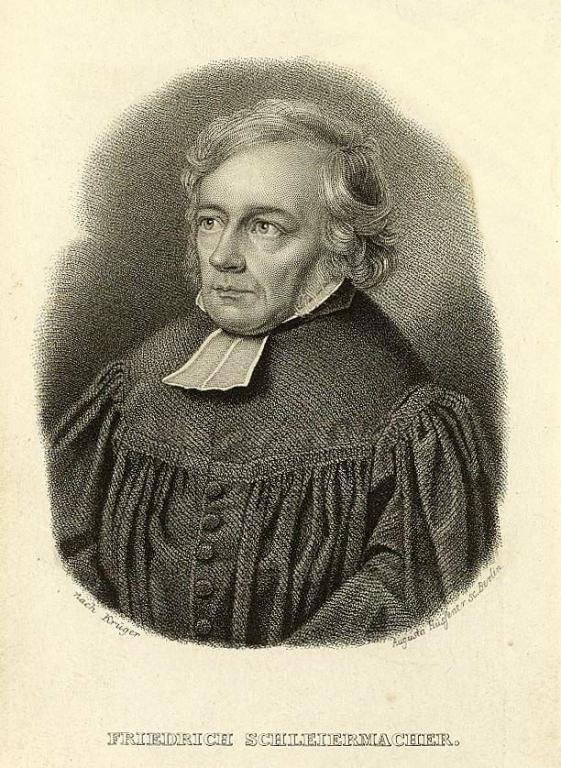
In “Evangelical Theology in the 19th Century,” Karl Barth writes, “There is hardly any doubt that the distinctive beginnings of 19th-century theology coincide with the publication of Schleiermacher’s book, On Religion, Speeches to Its Cultured Despisers in 1799.”[1] T. F. Torrance claims that perhaps the principal characteristic trait of this movement was the conviction “that theology and even biblical exegesis could only be pursued within the framework of the accepted or prevailing Weltanschauung or a generally intelligible view of the totality of things, human, cosmic and divine.”[2]
On this reading of Schleiermacher, the theologian’s mission is to demonstrate that religion, and theology with it, has an indispensable role to play in human culture, including the cultivation of its worldview. Schleiermacher’s Speeches is an apologetic for the Christian faith to its cultured despisers. E. Graham Waring writes, “Schleiermacher loved that in religion which was alive, and sought at once to show his ‘despising’ friends that it was not alien to their experience of culture, and to found it in human nature in such a way as to give it independent status.”[3] Schleiermacher saw himself as belonging to that “higher priesthood” that
strives to awaken the slumbering germ of a better humanity, to kindle love for higher things, to change the common life into a nobler, to reconcile the children of earth with the Heaven that hears them, and to counterbalance the deep attachment of the age to the baser side.[4]
Key to Schleiermacher’s appeal was his notion of the feeling of absolute dependence.[5] He wrote, “Quantity of knowledge is not quantity of piety.”[6] And while it would be impossible to be pious without also being moral, one cannot be scientific or moral without being religious, in Schleiermacher’s estimation.[7] For Schleiermacher, religion is not ultimately about doctrine and rational argumentation or moral duty, but about “immediate consciousness” of all finite and temporal reality in and through the infinite and eternal.[8]
It is often understood that Jesus’ significance on this view of religion is that he has greater God-consciousness than the rest of us. Thus, his uniqueness is quantitative rather than qualitative. There is no sense of Kierkegaard’s infinite qualitative distinction between God and humanity when assessed from this vantage point. However, it should be noted that not everyone agrees with this assessment of Schleiermacher’s Christology.
According to Kevin Hector, the oft-cited criticism that Schleiermacher’s Christology is low does not account for “the crucial role that actualism plays in [Schleiermacher’s] theology.”[9] Hector acknowledges that there are weaknesses in Schleiermacher’s thought, such as his lukewarm Sabellianism. However, Hector asserts that there is no feature in Schleiermacher’s Christology that involves the rejection of a robust Trinitarian framework.
Hector also claims that Schleiermacher’s Christology is “even higher than traditional Chalcedonianism” since, for Schleiermacher, “every moment of Christ’s life repeats the pure act of God’s being, such that Christ is God incarnate.”[10] While Schleiermacher’s Christology is fashioned around Christ’s “God-consciousness,” long conceived as a rejection of the deity of Christ, Hector reasons that against the backdrop of Schleiermacher’s actualistic theology, Christ’s God-consciousness “functions as the organ by which God’s pure act is apprehended and turned into Christ’s own activity.”[11] Christ’s God-consciousness does not ground or establish Christ’s deity. Instead, Christ’s God-consciousness is the divine or supernatural medium or vehicle which facilitates Christ’s manifestation or reproduction of God’s pure act every moment in his incarnate state. “The important thing about Christ, then, is not his God-consciousness per se, but the fact that this consciousness is the means through which God’s being is incarnated.”[12]
As already noted, Schleiermacher would make no allowance for piety apart from morality. In fact, Schleiermacher is remembered for his ethical preaching.[13] Now what is remembered of his theology, and those inspired by his progressive orientation? Further to Gustavo Gutiérrez’s analysis, given Schleiermacher’s preoccupation with doing theology in a world where cultured humanity has come of age, what place is there for doing theology among those who are struggling to be seen as human in this age?[14] Does our immediate consciousness of the eternal and infinite lead us to be theologically and culturally preoccupied with those our society often does not make time and space for? Or does such consciousness lead us to focus our attention on the cultured despisers of religion rather than those despised by the cultured? This is not simply a question for Schleiermacher. It is one that all of us must ask of ourselves.
________________
[1]Karl Barth, “Evangelical Theology in the 19th Century,” in The Humanity of God (Atlanta: John Knox Press, 1960), page 12.
[2]Thomas F. Torrance, Karl Barth: An Introduction to his Early Theology, 1910-1931 (London: SCM Press, Ltd., 1962), page 33.
[3]E. Graham Waring, introduction to On Religion: Speeches to its Cultured Despisers, by Friedrich Schleiermacher (New York: Frederick Ungar Publishing Company, 1955), page xii.
[4]Friedrich Schleiermacher, On Religion: Speeches to its Cultured Despisers, with an introduction by E. Graham Waring (New York: Frederick Ungar Publishing Company, 1955), page 8.
[5]Schleiermacher, On Religion, page 28.
[6]Schleiermacher, On Religion, page 27.
[7] Schleiermacher, On Religion, page 30.
[8] Schleiermacher, On Religion, page 28.
[9] Kevin W. Hector, “Actualism and Incarnation: The High Christology of Friedrich Schleiermacher,” in International Journal of Systematic Theology 8:3 (July 2006): 307.
[10]Hector, “Actualism and Incarnation,” page 308.
[11]Hector, “Actualism and Incarnation,” page 311.
[12]Hector, “Actualism and Incarnation,” page 312.
[13]Hughes Oliphant Old, The Reading and Preaching of the Scriptures in the Worship of the Christian Church, vol. 6, The Modern Age (Grand Rapids: Eerdmans, 2007), pages 94-95.
[14]See Gary J. Dorrien’s discussion of Gustavo Gutiérrez and Schleiermacher in Reconstructing the Common Good: Theology and the Social Order (Maryknoll: Orbis Books, 1990), page 107.












